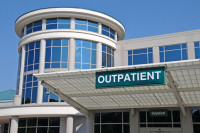The prices of health care services have long been opaque to the average person. Individuals often don’t know whether they are being overcharged or not.

But recent efforts by health insurers, state legislatures and private firms have begun to reveal more information about the cost of care for consumers.
Still, the picture is not always crystal clear.
As comparative information on health care prices has become more available in recent years, Atlanta and Georgia typically rank below the national averages. But a new comparison of hospital outpatient costs shows the opposite about metro Atlanta — with its hospitals ranking above the national average, and indeed among the most costly in the nation.
Health care data firm Amino ranks U.S. metro areas from least expensive hospitals to most expensive.

Buffalo, N.Y., was No. 1 with the least expensive outpatient hospital services, and Milwaukee 53rd as the most expensive metro area.
Metro Atlanta hospitals came in 43rd among 53 areas studied. (Here’s a link to the numbers.)
“From a data science perspective, we’re just starting to pull the curtain back on health care costs,’’ said Sameera Poduri of San Francisco-based Amino in a blog post. “With the right data and the right team, we can use claims data to figure out what’s been an industry secret for years — and my hope is that this newfound transparency will shift our behavior as health care consumers.”
The study did not break down individual pricing differences among metro Atlanta hospitals.
Consumers, especially those in high-deductible plans, have a big stake in pricing variations. They’re often paying hundreds and even thousands of dollars for a service before their insurance kicks in.
Such variability was demonstrated in a Castlight Health report last year that said prices for a regular baby delivery in the Atlanta area ranged from $5,831 to $10,700, with an average price of $8,497. And Castlight reported in 2015 that the costs of mammograms in Atlanta can vary enormously, with prices in Atlanta ranging from $89 to $488.

Ethan James of the Georgia Hospital Association, asked to respond to the new Amino rankings of hospital costs, told GHN that “I am not certain as to the methodology’’ that Amino used.
Chris Kane, a consultant with Progressive Healthcare, said the Amino rankings’ methodology refers to claims data but there are also references to costs and charges, adding that additional precision in these terms “is essential for credibility.”
Here’s a link to Amino’s explanation of its methodology.
Kane, though, said the Amino report “appeals to the consumer in all of us. We want a complex service synthesized into a headline, or even better, a dollar sign icon.’’
“Transparency about pricing and costs is largely absent in the hospital industry,’’ Kane said. “Amino and other researcher entities that attempt to remedy this shortcoming should be encouraged.”
Mike Cadger of Monocle Health Data, which ranks medical providers based on price and quality, said that the Amino study “compares only hospitals’ outpatient procedures and not inpatient procedures, so to say one hospital or market is overall more expensive is misleading.’’

But he said the Amino data “demonstrates that the same outpatient procedures performed in non-hospital settings are often less costly, and this is what hospitals must compete against.”
More relevant to consumers would be a tool to comparison-shop for procedures in a particular market, Cadger said.
“An example would be that an ACL surgery in Dallas ranges from $17,000 to $61,000, with a median price of about $31,000,’’ he said. “The same surgery in Atlanta has about the same price range and median overall.“
The most important issue, Cadger said, is determining what percentage of patients receive lower-cost surgeries “in order to conclude that competition and market knowledge of pricing is yielding better choices.”

